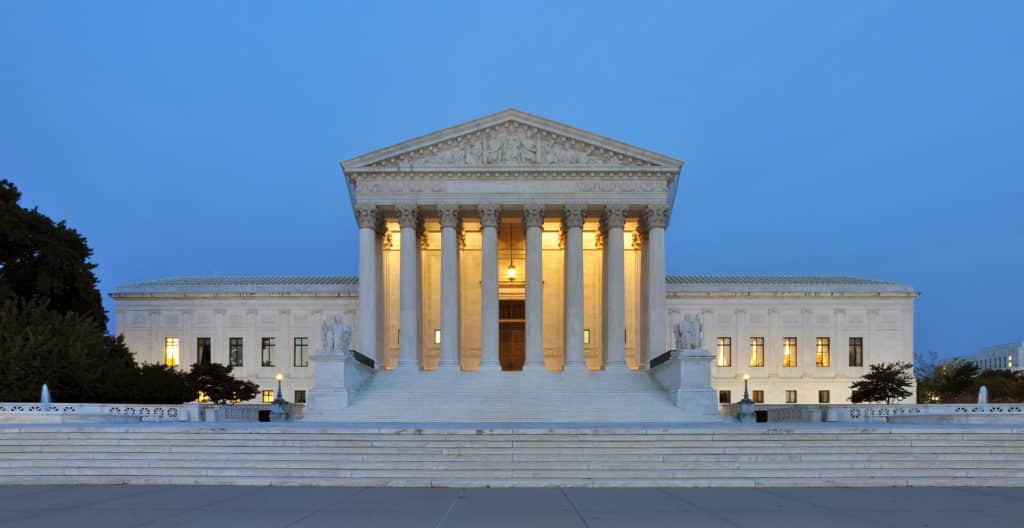In May, the U.S. Supreme Court agreed to hear a Sarbanes-Oxley Act (SOX) whistleblower case with widespread implications for the ability of whistleblowers to seek anti-retaliation protections under federal whistleblower laws.
Since the Court granted certiorari in the case, whistleblower advocates and government officials have filed a series of amicus briefs in support of the whistleblower urging the Court to overturn a Second Circuit decision voiding a nearly $1 million retaliation award.
The case, Murray v. UBS Securities, LLC, was filed by an ex-employee against UBS Bank. Trevor Murray alleges that he was fired from his role as a bond strategist at UBS because he refused to publish misleading research reports and complained about being pressured to do so. SOX prohibits employers from retaliating against employees because the worker reported financial wrongdoing.
However, in 2022, 2nd U.S. Circuit Court of Appeals ruled against Murray, saying he did not prove that UBS intended to retaliate against him by firing him. In contrast, other federal appeals courts have ruled that whistleblowers only need to prove that their whistleblowing was a “contributing factor” to a decision to fire them.
In an amicus brief filed on behalf of the National Whistleblower Center (NWC), the founding partners of Kohn, Kohn & Colapinto (KKC) give a detailed history of the drafting of SOX to demonstrate the Congressional intent behind a “contributing factor” standard of proof. The partners of KKC were actively involved in the drafting of the whistleblower provisions found in SOX and NWC is referenced in the legislative history of the act.
“In crafting the unique ‘contributing factor’ test for whistleblowers, Congress left an incredibly straight-forward legislative history documenting the value of whistleblowers’ contributions, the risks and retaliation whistleblowers faced, the barriers the previous burden of proof presented for whistleblowers, and Congress’ explicit intention to lower that burden of proof for whistleblowers,” the brief states.
“The United States Court of Appeals for the Second Circuit looked to the provision generally prohibiting retaliation against whistleblowers and took it upon themselves to raise the ‘contributing factor’ burden of proof to require a whistleblower to ‘prove that the employer took the adverse employment action against the whistleblower-employee with retaliatory intent,’” the brief continues. “This interpretation completely negates the purpose of Congress crafting the ‘contributing factor’ standard to lower the burden for whistleblowers and the plain meaning of the mandatory ‘contributing factor’ burden of proof.”
The federal government — represented by officials from the Solicitor General’s Office, the Department of Labor and the Securities and Exchange Commission — as well as Senators Chuck Grassley (R-IA) and Ron Wyden (D-OR) likewise filed amicus briefs arguing for a “contributing factor” standard of proof.
“In imposing a heavy burden on whistleblowers like petitioner, the court below failed to recognize that the whistleblower protections in SOX were included not just to protect employees who stood up for the law, but to protect investors and other employees whose lives and finances were devasted because employees like petitioner were reluctant to call attention to unlawful activities for fear of losing their jobs,” state the Senators in their brief. “It was to guard against future disasters like the collapse of Enron Corporation that Congress included only a modest burden on employees—to show that their disclosures were ‘a contributing factor.’”
In its brief, the federal government explains that the language in SOX “does not suggest that a whistleblower bears the burden of proving that some ‘retaliatory intent’ of the employer played a role in the decision. If Congress had intended to require that showing, it would have enacted text requiring a whistleblower to demonstrate that ‘reprisal,’ ‘retaliation,’ ‘retaliatory intent,’ or some other textual description of such a motive of the employer—rather than the protected activity of the employee—’was a contributing factor in the unfavorable personnel action.’”
An amicus brief filed by The Anti-Fraud Coalition (TAF), the National Employment Lawyers Association (NELA), and Better Markets, Inc. outlines the implications of the Second Circuit decision: “The Second Circuit’s requirement that plaintiffs prove the defendant’s intent in order to receive these protections would discourage would-be whistleblowers from taking the significant risk of coming forward to report financial frauds. Unless reversed, the decision will insulate financial misconduct from detection and prosecution. Investors, financial markets, and potentially our entire economic system will suffer the negative consequences.”
Further Reading:
The Amicus Briefs filed in Murray vs UBS, Inc.
Supreme Court to Hear Whistleblower Retaliation Case with Widespread Implications
